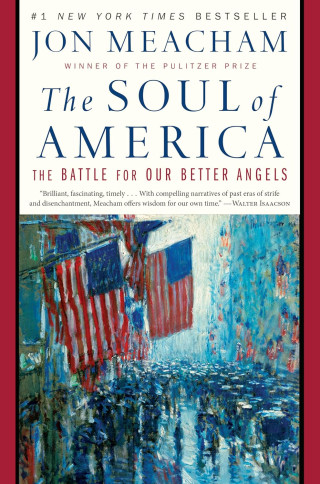Meacham is what some academics have dubbed a “Dad historian,” a dismissive term to describe the type of authors who appeal to middle-aged (typically white) men. Think Ron Chernow, David McCullough, and H.W. Brands (or, if you must, their inferior imitators, like Brian Kilmeade, Don Yaeger, and Bill O’Reilly). While university-educated, the majority of these writers have journalistic backgrounds and are based outside university history departments (Brands being a notable exception). Their work tends to focus on influential political figures (mostly presidents or Founding-era individuals) or pivotal military moments (mostly from the Civil War or World War II).
All this applies to Meacham: Although he now has a named chair at Vanderbilt, he is not an academic by training but a journalist and editor. He cut his teeth as a writer for the Chattanooga Times before establishing himself as a leading voice for the Washington Monthly and Newsweek. Meacham’s first book, Franklin and Winston: An Intimate Portrait of an Epic Friendship, became a New York Times bestseller and his profile of Andrew Jackson, American Lion, earned a Pulitzer. He has also written biographies of Thomas Jefferson, George H.W. Bush, and John Lewis. In general, Meacham seems drawn to contradictory figures who triumphed in moments of crisis: Jackson, the symbolic champion of democracy who held the Union together in the face of the nullification crisis, yet who enslaved black Americans and removed indigenous peoples from their native land. Jefferson, the leading revolutionary figure and author of the Declaration of Independence who enslaved six hundred human beings—one of whom, Sally Hemings, he fathered at least six children with.
Given the heated climate in which the nation’s past is discussed these days—with radical statue-topplers squaring off against conservative ignoramuses—it is little wonder that someone like Jon Meacham and the stories he tells about America can be so appealing.

Jon Meacham in 2016. (Photo by Gage Skidmore [CC BY-SA 2.0])
In the early years of the Trump presidency, Meacham released The Soul of America: The Battle for Our Better Angels, a text that resonates with Biden’s call to “restore the soul of America” and his “battle for the soul of America” slogan. As Kara Voght highlighted for Mother Jones, Meacham’s appeal to Biden and Biden voters is obvious, as he evokes a politics “above partisan conflict, championing a civic Christianity and orienting American history around certain core national values.” Voght scoffs at this, particularly Meacham’s interest in Jefferson, and argues that Meacham’s American “mythmaking” ought to be supplanted in favor of a different American story: “Biden’s presidency will be measured by the extent to which he can supplant the lessons of his muse [Meacham] with a new old story about the soul of America.”There are two problems with this argument, though. First, while Voght’s point about “supplant[ing]” old stories about America is well taken—again, the process of historical revisionism is never-ending and largely healthy—this is not a process that can be expedited. It takes time. The historical work, the teaching, the sentiments and attachments—the mystic chords of memory—can be very slow to change. Put simply, the American people like the American story and are not quick to reject parts of it.
